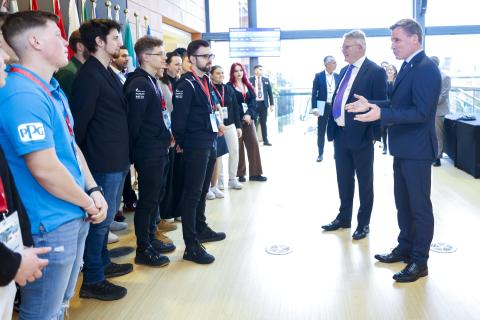European Economic
and Social Committee
EESC President
EESC President
Meet the Champions of Excellence: EESC and European Commission put spotlight on vocational training to address labour shortages
On 23 February, the European Economic and Social Committee (EESC) and the European Commission held a flagship event for the European Year of Skills, bringing together over 400 young people from all EU Member States to shine the spotlight on the skills needed for current and future jobs. From car painting and floristry to mechanical engineering and demining robots in Ukraine, young people had a chance to learn first-hand about changing skills and the value of vocational education and training (VET).
As Europe is moving towards more digital and green jobs, the current labour market is suffering from a persistent lack of skilled workers, with more than three quarters of companies in the EU reporting difficulties in finding workers with the necessary skills. VET, championed by EESC President Oliver Röpke and Commissioner for Jobs and Social Rights Nicolas Schmit, offers sound career prospects and quicker job opportunities for young people, as well as adults looking to change jobs or simply upgrade their existing skill set.
EESC President Oliver Röpke said: Skills are a key ingredient for empowering young people to thrive in both their personal lives and their careers. With the digital and green transitions ongoing, we have the power, through skills, not only to adapt but also to sculpt the jobs of tomorrow. It is inspiring to see so many skills champions today, dedicated to pursuing their passions and advocating the value of VET.
Commissioner for Jobs and Social Rights Nicolas Schmit said: Vocational training offers so many opportunities in today’s labour market. I am convinced that VET has the potential to help us address the skills mismatches and labour shortages that are holding back Europe’s industries. Meeting the skills champions from across Europe was a great honour, and I hope it has inspired many young people to consider whether vocational training could be the right path for them.
Preparing youth for the jobs of tomorrow
The event showed that VET is an excellent choice, offering strong career prospects and quicker job opportunities. In 2021, just over half the students enrolled in medium-level education in the EU were in programmes with a vocational orientation.
The aim of the ‘Meet the Champions of Excellence’ event was to promote the benefits and opportunities offered by VET, especially in the current context of labour and skills shortages and skills mismatches in the EU, and against the backdrop of the green and digital transitions and the future world of work.
The Meet the Champions of Excellence
event featured 35 young EU champions from recent WorldSkills and EuroSkills competitions as well as from Abylimpics (skills Olympics for people with disabilities), where competitors participated in more than 20 different disciplines, such as mobile robotics, ICT, mechanics, floristry, graphic design, automotive technologies and construction. The champions, most of whom are under 25, shared inspiring stories of their learning and career paths. There were over 500 event participants, including over 400 young people from all EU Member States.
In addition, young people could observe and learn about traditional and new skills during specific demonstrations in areas such as floristry, car painting, robots and virtual reality, like robot system integration, a demining robot for Ukraine and mechanical engineering CAD. The event also included interactive workshops and discussions on the skills needed for the future and to adapt to the digital and green transitions, on transnational learning mobility and on promoting gender equality in VET.
Background
In 2022, almost 80% of recent VET graduates managed to get a job, with the EU aiming to reach a target of 82% by 2025. With many unfulfilled vacancies across the EU in vocational jobs such as cooks, bakers, waiters, nurses, bricklayers, carpenters, plumbers, electricians, welders, mechanics and drivers, VET can help students quickly seize current and future job opportunities, providing them with work-based learning experiences. VET programmes are suitable for adults looking to upskill and reskill and can help people of all ages discover their talents and embark on new, often successful and rewarding careers.
In particular, VET will play a crucial role in ensuring that everyone acquires the relevant digital skills, as projections show that they will be required for 9 out of 10 jobs by 2030. While current figures show that 44% of Europeans lack even basic computer skills, software developers, application programmers and systems analysts are already among the most widespread job vacancies in Europe.
VET programmes can also equip students with the right skills for a carbon-neutral Europe as many new jobs will be linked to waste and water management, sustainable construction or electrical and electronic trades. For example, working with electric and hybrid vehicles and wind turbine technology will also require digital skills.
The participants in today’s event included representatives from the EESC and its Labour Market Observatory, as well as from the European Commission. Organisations focusing on education, training, young people and social dialogue also took part, including the European Youth Forum, the European Apprentices Network, Cedefop, the European Training Foundation, the Lifelong Learning Platform, social partners and many others.
Year of Skills website: https://year-of-skills.europa.eu/index_en
Work organisation
Contact
Oliver Röpke European Economic and Social Committee rue Belliard/Belliardstraat99-101 1040 Brussels Belgium
Tel (secretariat): +32 (0)2 546 99 32
Email (secretariat)
Media Contact
For press and media inquiries, please contact the President's SpokespersonFor photos of the President, please consult the EESC Media Library
